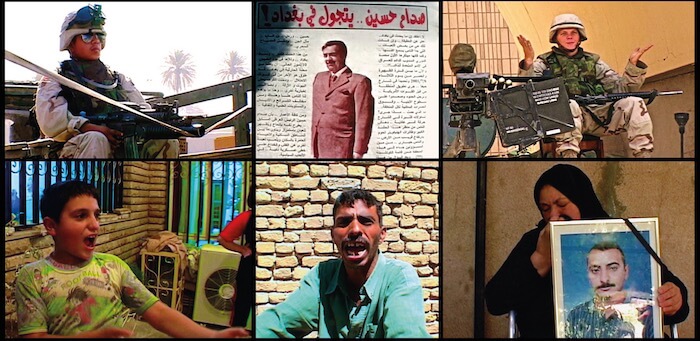Life During Wartime: Homeland (Iraq Year Zero)

Homeland (Iraq Year Zero)
Directed by Abbas Fahdel
Parts 1 and 2 October 6-12 at Anthology Film Archives
Iraqi-French director Abbas Fahdel’s Homeland (Iraq Year Zero) is the best film I’ve seen about the disastrous US invasion and occupation of Iraq. At five-and-a-half hours long, Homeland will likely test the endurance of even the most hardcore cinephiles. Yet every second of that runtime is meaningful, with Fahdel documenting verite-style on home video his Baghdad family’s fear and tension-relieving levity as they prepare for the 2003 American bombing and ground assault that unseated Saddam Hussein’s dictatorial regime. That’s part one, titled “Before the Fall.” Part two, “After the Battle,” skips over the bombing itself to show the confusion and chaos of Iraq’s tumultuous transition to life under US occupation and then a poorly functioning democracy.
Fahdel’s brother, sister-in-law, and nieces and nephews—and, to a lesser extent, friends—provide the emotional core of Homeland. Caught in the crossfire of imminent conflict, they perform tasks like constructing pumps in their backyards in case running water ceases during hostilities, buying diapers to serve as gas masks (the children laugh endlessly at this), and watching state-sanctioned coverage of the threatened invasion. Yet they also attend school, celebrate marriages, work at their jobs, cook meals, play silly games. We come to feel how relatively normal war is for Iraqis—at one point we see Fahdel’s nephew Haidar place new tape over the old, Gulf War-era tape that protects the family’s windows. For Americans “collateral damage” is understood in a largely statistical manner: so-and-so many dead civilians, etc. For Iraqis this damage has directly impacted their loved ones, their neighborhoods, themselves. It is deeply, painfully personal and forever part of their history.
Homeland becomes especially poignant when its second part expands and complicates the first. With the deposing of Saddam Hussein Iraqis finally discuss his oppressive corruption and violence—while he remained in power, even speaking of loved ones who were murdered as part of his reign of terror invited danger, and so the Saddam-as-messiah TV propaganda and avoidance of the subject from Fahdel’s relatives (who had family members abducted and killed by the dictator) in the “Before the Fall” section retroactively speak volumes. (Some interviewees look back on the Saddam regime with fondness, but judging from the spontaneous, near-ubiquitous celebratory gunfire that greets the news of his capture these apologists appear far outnumbered.) At the same time the American military brings its own destruction and humiliation, and Fahdel spends ample time documenting post-“Shock and Awe” Iraq’s cultural ruins (bombed radio stations, film studios) and human devastation (children burned by exploding missiles, families wiped out by marauding homegrown gangs.) Rather than restore order, US rule creates electricity shortages, hunger, dispossession, and thus widespread discontent—any discerning American has known this for years, but how many have seen eyewitness testimony and evidence of it?
For a while the invasion and occupation impact Fahdel’s family only in minor ways—the women can only leave the house accompanied by the men, for instance. Yet we know the fate of some of them from subtitles Fahdel intermittently employs to trouble subsequent footage. Relatively early on Homeland informs us that Haidar will be killed during the occupation, rendering the innocence and precocity of his reactions to the strangeness of post-invasion Baghdad haunted, sacred moments. The last scene cuts out just before Haidar’s death at the hands of roving bandits; a final shot of his grave follows along with a subtitle explaining that two of his cousins would go on to have their lives similarly cut short. Homeland encapsulates the tragedy of a conflict that still causes untold suffering and proves Fahdel’s power to bear witness and provide a voice to the victims of war who have too often been ignored into silence.
You might also like 



















